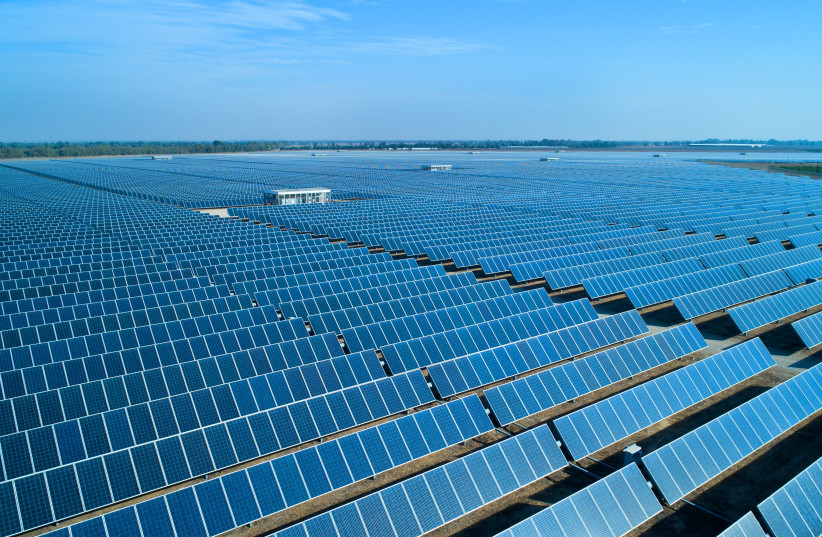We should embrace each other, not a radical UN climate agenda.
By FRED ZEIDMAN, VICTORIA COATES OCTOBER 31, 2021

As energy shortages convulse Europe and Asia, the US and Israel find themselves in the enviable position of having not only sufficient energy production to support domestic needs, but also excess to export in support of more stable global energy flows.
This represents a tectonic shift for both our historically energy vulnerable nations and opens up previously unimaginable potential for us to partner together to our mutual benefit as we emerge from the COVID-19 pandemic.Ensuring the free passage of energy from the Persian Gulf to supply both America and fellow importers such as Israel has for decades been a key pillar of both our Middle East and energy policies.
Those of us old enough to remember the crises of the 1970s with skyrocketing prices and interminable gas lines know all too well how critical this energy source has been to our economy, and how sensitive we have been to its disruption. These memories make the images of modern-day gas lines in the United Kingdom and Germany’s desperate scramble for supplementary coal supplies all the more jarring, especially as they have been self-inflicted by irresponsible energy policies implemented in the name of climate change.
Both the United States and Israel can learn from this unhappy state of affairs and avoid a similar fate, while we take advantage of our radically new energy posture. Even with ample supply, we are both still vulnerable to price spikes, but the answer to this problem is not increased imports from the Gulf. We don’t need to ask for help to do this when we can do it ourselves by boosting production and, most importantly, by encouraging exploration and development of new resources. 
In addition, the US can strongly support the proposed pipeline between Israel and Egypt for export via the facilities near Alexandria. We can revisit the Eastern Mediterranean pipeline that would give Europe a badly needed alternative to Russia’s Nord Stream 2 pipeline. These prudent investments now will ensure the citizens of both our countries enjoy the bountiful energy with which they have been blessed, even as we continue to explore further diversification of supply through renewables and alternatives such as hydrogen.
US President Joe Biden, 13 senior members of his administration and their attendant staffs are descending en masse upon Glasgow, Scotland, for the UN-sponsored COP26 climate change conference. This huge delegation is the physical embodiment of the administration’s stated intent to prioritize climate change as the strategic driver of policies across the US government, as was signaled on the first day of Biden’s term when he canceled the Keystone Pipeline on the grounds that the United States would be aggressively transitioning away from fossil fuels, so the project was already an anachronism.
This desire to mitigate climate change is no doubt well intentioned, and lofty goals and aspirations are admirable, but they must be tethered to reality if they are to have any hopes of being achieved. The unfortunate reality is that at this point, neither the United States nor Israel can single-handedly impact climate change. While it is true that America is historically the world’s biggest polluter, it has also done an enormous amount to reverse this trend, primarily through the conversion to clean natural gas, which has also helped Israel reduce emissions more than 3% over the last year. The People’s Republic of China is now the world’s largest carbon emitter, a status it achieved in 2006. In 2019, the PRC added supremacy in greenhouse gas emissions.
While President Xi made some widely praised promises at the September meeting of the United Nations General Assembly to begin China’s road to net-zero, his actual subsequent actions show us that he is much more interested in keeping China’s Belt and Road initiative on track. As the energy crisis worsened in October, the carbon pledges have gone out the window, as the PRC has doubled down on coal, the chief source of global emissions, accelerating construction of new plants in China, and even considering reversing its pledge to stop building new plants abroad. As a final insult, Chairman Xi declined to attend COP26 himself, sending only his climate envoy. Clearly, Xi has bigger fish to fry.In light of this reality, it is ridiculous for the United States to continue coddling China as a “developing” nation. Rather, the US should recognize that Xi’s regime has no sense of obligation to the world it is polluting. Instead of embracing a UN-driven agenda in Glasgow that will disproportionately burden America, we should embrace fellow friendly, free-market producers such as Israel and coordinate our efforts to the world’s benefit.
Fred Zeidman is co-chairman of the Council for a Secure America and Victoria Coates is a Senior Fellow at the Center for Security Policy and former deputy national security adviser for Middle Eastern and North African Affairs.
https://www.jpost.com/opinion/us-and-israeli-energy-miracles-can-fuel-the-future-opinion-683645
